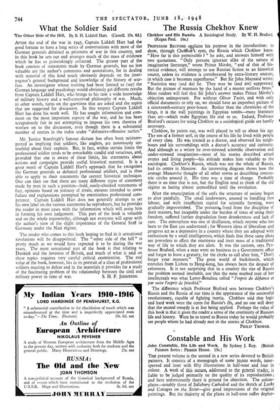What the Soldier Said
The Other Side of the Hill, By B. H. Liddell Hart. (CasselL lOs. 6d.)
AFTER the end of the war in 1945, Captain Liddell Hart had the good fortune to have a long series of conversations with most of the German generals detained as prisoners of war in this country, and in this book he sets out and arranges much of the mass of evidence which he has so painstakingly collected. The greater part of the book consists of statements made by German generals, but no less valuable are the author's comments and annotations, for in dealing with material of this kind much obviously depends on the inter- rogator's general background and knowledge of the history of war- fare. An investigator whose training had been limited to (say) the German language and psychology would obviously get different results from Captain Liddell Hart, who brings to his task a wide knowledge of military history and a well-conceived philosophy of war. Much, in other words, turns on the questions that are asked and the topics that are suggested for discussion. In this respect Captain Liddell Hart has done his work well. He has sought information and com- ment on the most important aspects of the war, and he has been scrupulously fair in not attempting to impose his own theories of warfare on to the discussion, even though there is a substantial number of entries in the index under "defensive-offensive tactics."
Mr. Justice Stareleigh's famous dictum has often been misinter- preted as implying that soldiers, like anglers, are notoriously un- truthful about their exploits. But, in fact, within certain limits the professional soldier tends to be remarkably candid and veracious, and, provided that one is aware of these limits, his statements about actions and campaigns .provide useful historical material. It is a great merit of Captain Liddell Hart's approach that he recognises the German generals as defeated professional soldiers, and is thus able to apply to their statements the correct historical technique. One can then see that there are many different types of statement made by men in such a position—bald, easily-checked statements of fact, opinions based on jealousy of rivals, excuses intended to cover failure and explanations prompted by emotionless professional com- petence. Captain Liddell Hart does not generally attempt to set his own label on the various statements he reproduces, but he provides the reader in most cases with the information which will assist him in forming his own judgement. This part of the book is valuable and on the whole trustworthy, although not everyone will agree with the author's view of the slight importance of the General Staff in Germany under the Nazi &gime.
The reader who comes to this book hoping to find in it sensational revelations will be disappointed. The "other side of the hill" is pretty much as we would have expected it to be during the war years. The most sensational part of the book is that relating to Dunkirk and the invasion of Britain, and much of what is said on these topics requires very careful critical examination. The real value of the book, however, lies in its portrait of a class of professional soldiers reacting to defeat and in the materials it provides for a study of the fascinating problem of the relationship between the civil and


































 Previous page
Previous page